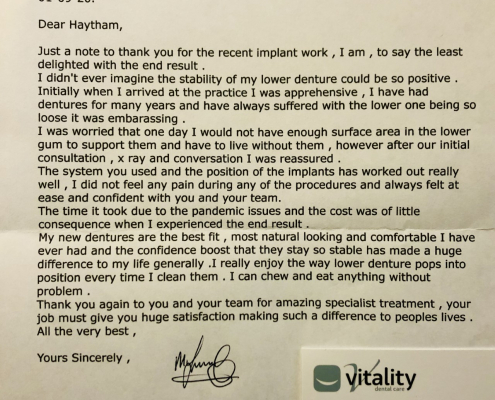Dental Implants
The most natural feeling replacement for missing teeth.
Haytham Abbas BDS, MFDS (RCS Eng), Diploma Implant Dentistry GDC No. 101012 and Nigel Suggett BDS Dip Cert. Dent Imp GDC No. 103408 are both highly experienced in dental implant treatment.
Dr Abbas also offers Sedation treatment for patients who are anxious about having dental treatment.
Missing teeth can cause a problem with lost bone and gum around the remaining teeth and may lead to a problem with eating and the functioning of the jaw. The gaps can place extra pressure on remaining teeth especially on the opposite jaw, causing premature wear.
Dental Implants are a well-established, tried-and-tested treatment. In excess of 90% of modern implants last for at least 15 years.
Placing the implants requires a small operation which can be carried out under local anaesthetic. You will not feel any pain at the time, but you may feel some discomfort during the week following the surgery. The after-effects of having implants placed are usually mild and may include slight bruising, dull ache and swelling. The effects vary, depending on the number of implants placed.
It depends on the bone density in your jaw and the health of your gums. At the consultation your clinician will assess the health of your gums, the density of your bone and in some cases, you may require a CT Scan. The CT scan provides a 3D image of all regions of the upper and/or lower jaw from which precise measurements can be taken for pre-operative treatment planning. In some cases the CT scan may also be used to evaluate the results of bone grafting procedures prior to placing implants.
Sometimes treatment is required before you are ready for implants. Implants survive best in a healthy mouth. Tooth decay or gum problems need to be corrected before implants are placed to give them the best chance of success.
This depends on the complexity of the treatment. Initially there is a planning stage, then some time may be spent on preparatory procedures such as improving gum health, removing any unsavable teeth and growing bone. After the implants are placed they are left to settle in place from three to six months. The final fitting of crowns or bridges or the attaching of dentures to the implants takes a month or two.
The time depends on your individual situation. It is important that neither the patient nor the implant provider attempt to rush the treatment or try to advance the various stages faster than the time required for complete healing and maturation of the bone and soft-tissues.
Cleaning around the teeth attached to the dental implants is no more difficult than cleaning natural teeth.
Patients often ask if dental implants are expensive and to answer would depend on your perspective.
What’s the most expensive thing you purchased recently? Do you feel it was worth the investment? How long will it last you? Is it something you really needed?
Dental implants are an investment in your health. It’s as simple as that.
They help you eat food which nourishes the body. If your diet is restricted to the food you are able to eat then, your health could suffer.
Dental implants can also help protect your remaining teeth. Leaving gaps in your teeth can allow the teeth on either side of the gap to drift, they may become wobbly or the jaw bone where the gap is, will recede. (This is when the face takes on a sunken appearance, giving aging appearance).
So, what are the alternatives?
Leave it the gap – you are not bothered about looking older, struggling to eat the food you enjoy or your teeth drifting.
Replace the gap with a denture – a perfectly fine replacement which is available on the NHS. It can be uncomfortable to wear, becomes loose as the mouth changes shape over time and the tooth is prone to breaking from the palate if too much pressure is applied.
Ok, so what about a bridge. Yes, bridges are also available on the NHS. They involve removing some of the healthy teeth either side of the space so a ‘cap’ can be placed which supports a tooth to fill the space. Downside of this treatment is damaging otherwise healthy teeth. Bridges can fail and you have to be careful how hard you bite on them.
The final option is a dental implant. Fixed and secure, it will act just like a natural tooth, giving you the confidence to eat the food you want, prevent teeth from drifting and maintain bone density. With a success rate in excess of 90%, a dental implant is an investment in you and can last for over 25 years, if you maintain excellent oral hygiene.
For total confidence in your teeth, the investment could be from from £2730.00, for a single dental implant.
If you would like to have total confidence in your teeth, book a remote consultation with one of our dentists to find out if this is a solution for you.
We also offer interest free finance to help spread the cost of treatment.
*Cash price from £2730.00. 18 monthly payments of available. No deposit, total payable from £2730.00. Finance applicable to patients over 18, Terms and Conditions apply.
We regularly receive positive feedback from our patients about the positive impact dental implants have had on their lives. For more reviews please click here


You will need a consultation with Dr Abbas or Dr Suggett to assess your suitability for dental implants. If you would prefer you can have a free consultation with our Treatment Coordinator, Katie, who can give you more information and some rough costs for your treatment.
To start your journey please complete our enquiry form and someone will call you back.